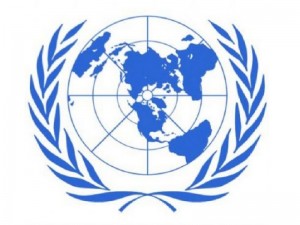MANILA, Philippines—While the sob stories usually make the headlines, the country’s efforts to help thousands of overseas Filipinos, especially those caught in wars and calamities, have not gone unnoticed in the United Nations.
A UN executive speaking at a recent conference in Geneva has commended the Philippines for its exemplary efforts to protect its nationals caught in international crisis situations, according to the Department of Foreign Affairs (DFA).
Peter Sutherland, the special representative of the UN secretary general for international migration and development, “specifically mentioned the Philippines as rising to the challenge by setting up a system to protect and engage its migrants,” the DFA said.
Sutherland made the remarks at the Global Forum on Migration and Development (GFMD) held in the Swiss city earlier this month, where he said the forum participants “could learn from the Philippines’ initiatives and good practices,” the foreign office added.
The Philippines drew praise for its repatriation efforts in troubled countries like Libya, Yemen and Syria, among others, DFA spokesperson Raul Hernandez told the Inquirer on Saturday.
“He (Sutherland) probably saw that we’re proactive in protecting our people by taking them out of harm’s way,” Hernandez said.
In the forum, the UN official also drew attention to the plight of domestic workers, particularly the so-called “kafala” or sponsorship system which he said “constituted a modern form of slavery,” the DFA said.
More fleeing Syria
Hernandez said another batch of at least 51 Filipinos from Syria will be repatriated in the next few days. The last group that arrived in Manila over a week ago totaled 55, bringing the current number of Filipino repatriates to 240 since political violence escalated in the Arab state earlier this year.
“Our embassy in Damascus continues to negotiate for the release of the workers from their employers or agencies,” Hernandez said, adding that securing airline seats for the next batch had been difficult of late because of the peak Christmas season.
The year 2011 has been one of the busiest for the DFA in terms of evacuating Filipinos from strife-torn regions, starting with those fleeing Egypt in February, at the height of street protests against the regime of then President Hosni Mubarak.
From that same month to March, the repatriation efforts shifted to Libya, with no less than Foreign Secretary Albert del Rosario personally leading one of the missions across the Sahara desert to fetch compatriots fleeing the fighting between rebels and government forces under dictator Moammar Gadhafi.
The turmoil in Yemen also prompted Del Rosario to go there in March to assess the situation and offer voluntary repatriation to the less than 1,500 registered migrant Filipinos working in that country.
Review of ‘unsafe’ countries
Apart from the repatriation efforts, the DFA is currently conducting a review of the 41 countries earlier considered unsafe for overseas Filipino workers (OFWs) and could be covered by a labor deployment ban.
“At present, we have asked a review of the present status of each of the 41 countries to determine if they have already acceded or enacted laws that would protect our migrant workers,” Hernandez said in an earlier interview.
The DFA proceeded with the review after asking the Philippine Overseas Employment Administration (POEA) to defer the ban for three months.
“We will use the deferment period to revisit the 41 countries with the view of moving forward toward compliance with the amended Migrant Workers Act (Republic Act No. 10022),” which forbids the deployment of OFWs to countries certified as not protective of migrant workers, Hernandez said.
“We will submit new certifications after 90 days, taking into account results of DFA’s dialogue with countries concerned and new developments in those countries with respect to the protection of migrant workers,” Hernandez said.
9M in 200 countries
More than 1.4 million Filipino workers were deployed overseas last year, according to the POEA. Of this number, 1.1 million were land-based, while around 350,000 were sea-based workers.
For land-based OFWs, the top destinations were Saudi Arabia (293,049), United Arab Emirates (201,214), Hong Kong (101,340), Qatar (87,813) and Singapore (70,251).
Among the newly hired overseas Filipino workers deployed last year, the top occupational categories included household service workers (96,583), cleaners and related workers (12,133), nurses (12,082), caregivers and caretakers (9,293), and waiters, bartenders and related workers (8,789).
According to the latest estimates by the Commission on Filipinos Overseas, some 9 million Filipinos are in more than 200 countries around the world as of December 2009. With a report from Inquirer Research
Sources: Commission on Filipinos Overseas, POEA
